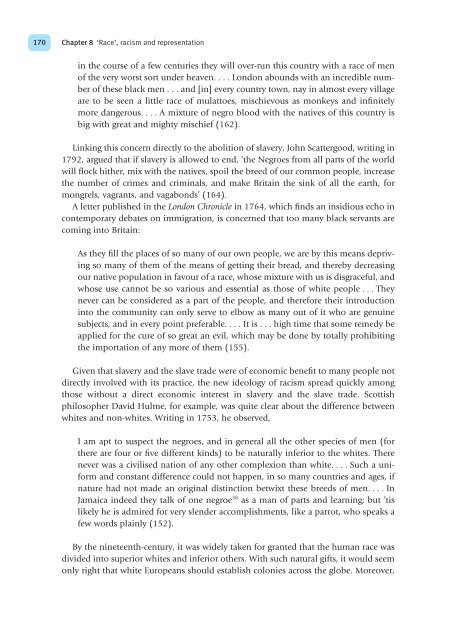Cultural Theory and Popular Culture
Cultural Theory and Popular Culture
Cultural Theory and Popular Culture
You also want an ePaper? Increase the reach of your titles
YUMPU automatically turns print PDFs into web optimized ePapers that Google loves.
170<br />
Chapter 8 ‘Race’, racism <strong>and</strong> representation<br />
in the course of a few centuries they will over-run this country with a race of men<br />
of the very worst sort under heaven. . . . London abounds with an incredible number<br />
of these black men . . . <strong>and</strong> [in] every country town, nay in almost every village<br />
are to be seen a little race of mulattoes, mischievous as monkeys <strong>and</strong> infinitely<br />
more dangerous. ...A mixture of negro blood with the natives of this country is<br />
big with great <strong>and</strong> mighty mischief (162).<br />
Linking this concern directly to the abolition of slavery, John Scattergood, writing in<br />
1792, argued that if slavery is allowed to end, ‘the Negroes from all parts of the world<br />
will flock hither, mix with the natives, spoil the breed of our common people, increase<br />
the number of crimes <strong>and</strong> criminals, <strong>and</strong> make Britain the sink of all the earth, for<br />
mongrels, vagrants, <strong>and</strong> vagabonds’ (164).<br />
A letter published in the London Chronicle in 1764, which finds an insidious echo in<br />
contemporary debates on immigration, is concerned that too many black servants are<br />
coming into Britain:<br />
As they fill the places of so many of our own people, we are by this means depriving<br />
so many of them of the means of getting their bread, <strong>and</strong> thereby decreasing<br />
our native population in favour of a race, whose mixture with us is disgraceful, <strong>and</strong><br />
whose use cannot be so various <strong>and</strong> essential as those of white people . . . They<br />
never can be considered as a part of the people, <strong>and</strong> therefore their introduction<br />
into the community can only serve to elbow as many out of it who are genuine<br />
subjects, <strong>and</strong> in every point preferable. . . . It is . . . high time that some remedy be<br />
applied for the cure of so great an evil, which may be done by totally prohibiting<br />
the importation of any more of them (155).<br />
Given that slavery <strong>and</strong> the slave trade were of economic benefit to many people not<br />
directly involved with its practice, the new ideology of racism spread quickly among<br />
those without a direct economic interest in slavery <strong>and</strong> the slave trade. Scottish<br />
philosopher David Hulme, for example, was quite clear about the difference between<br />
whites <strong>and</strong> non-whites. Writing in 1753, he observed,<br />
I am apt to suspect the negroes, <strong>and</strong> in general all the other species of men (for<br />
there are four or five different kinds) to be naturally inferior to the whites. There<br />
never was a civilised nation of any other complexion than white. . . . Such a uniform<br />
<strong>and</strong> constant difference could not happen, in so many countries <strong>and</strong> ages, if<br />
nature had not made an original distinction betwixt these breeds of men. ...In<br />
Jamaica indeed they talk of one negroe 38 as a man of parts <strong>and</strong> learning; but ’tis<br />
likely he is admired for very slender accomplishments, like a parrot, who speaks a<br />
few words plainly (152).<br />
By the nineteenth-century, it was widely taken for granted that the human race was<br />
divided into superior whites <strong>and</strong> inferior others. With such natural gifts, it would seem<br />
only right that white Europeans should establish colonies across the globe. Moreover,
















